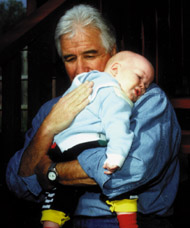In recent years, some high-profile men have become fathers in their fifties and sixties: Paul McCartney, David Letterman, and the list goes on. They are part of a growing trend of men having children later in life.
Over the past 3 decades, a number of factors have contributed to the older-father trend:
- Couples are marrying later, delaying first childbirth;
- More men are having children in second families; and
- Longer life-expectancy rates are affecting men’s attitudes about having children.
 Becoming a dad later in life presents advantages and challenges.
Becoming a dad later in life presents advantages and challenges.
The advantages: fathers who are older typically have more leisure time, more financial resources, and seem to be more thoughtful and proactive in their family commitment simply because they are settled in their careers.
On the challenging side, older fathers are faced with declining energy and a sense that their mortality is much nearer. They are cognizant of the limited amount of time they have, and are conscious of how they could be mistaken as their child’s grandfather. Also, it’s much more difficult for them to form connections with peers who are in the same age group and situation.
Regardless of your age at your child’s birth, you can capture the fulfillment, joy and laughter of fatherhood in your home. From his comments on one program before his son was born, David Letterman clearly experienced this joy. He said, “I could never imagine ever being part of something so beautiful.”

